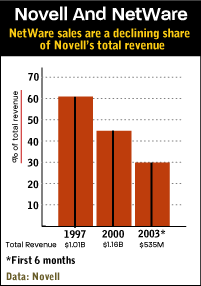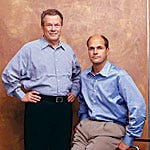Novell's plan to buy SuSE combines business-tested software with the open-source operating system

Will the combination of an old-line proprietary software company with roots in Utah and an up-and-coming open-source distributor in Nuremberg, Germany, add to Linux's momentum? That's the thinking behind Novell's planned acquisition of SuSE Linux AG for $210 million, disclosed last week, which brings together Novell's large installed customer base with SuSE's business-ready Linux operating system. It may be the best of two worlds--if Novell can pull it off.
Already, Novell is getting some help: IBM says it will invest $50 million in Novell. The deal shows that "Linux is continuing to make its way into the mainstream," says Tony Iams, a senior analyst with DH Brown Associates. "Some people may see it as the passing of an era, the freewheeling, grassroots time when everything was free."
Linux, of course, has been going commercial for several years. Distributors such as SuSE and market leader Red Hat Inc. have been combining Linux with other software and services and selling it all to business customers. "Vendors charge the end user for the value they add by packaging Linux in such a fashion that I don't have to [do it myself]," says Joe Poole, manager of technical support for Boscov's Department Stores LLC. The chain of 40 retail stores has run file, database, gift-registry, and invoicing apps on SuSE Linux on an IBM z900 mainframe for nearly two years.
|
|
| |
|
Novell has been taking the network services it has built on NetWare, its flagship network operating system, and making them run on the Linux kernel. Version 1.0 of Nterprise Linux Services, due later this year, will bring many mature, business-tested network services to the open-source environment: identity, file, printing, messaging, management, and portal services. "Our objective is to reduce impediments to Linux in the enterprise," Novell vice chairman Chris Stone said at a press conference last week.
IBM's investment in Novell sweetens the deal for Linux users, says Tom Fischer, assistant VP of data systems at GuideOne Insurance. "Now [SuSE] probably has more capital behind them," he says. GuideOne has run intranet, file, and print servers on SuSE Linux and an IBM mainframe for two years. The company expects that by the end of next year it will have saved $125,000 by moving these functions off Windows NT servers, Fischer says.
Most of SuSE's customers are in Europe. Novell, with 1,200 engineers, about half of them working on Linux products, and a strong network of resellers and integrators, thinks it can help SuSE build a stronger presence in North America. "Novell has 80% of the Fortune 500 as customers, and we expect many of them will buy from Novell and SuSE," Novell chairman and CEO Jack Messman said last week. Novell sees opportunities to attract companies currently using Windows 95 and 98 desktops.
Microsoft says not to count on any of that. The Novell-SuSE deal changes the Windows-Linux debate and works to Microsoft's advantage, says Martin Taylor, general manager of platform strategy in Microsoft's Windows server division. "This gives us the opportunity to have a conversation with our customers around the commercial quality of the operating system they're choosing, as opposed to the choice being part of a religious sort of movement." For Novell, the acquisition should solve two problems. It lets the vendor sell a more integrated software stack, while reducing the company's heavy dependence on NetWare, which accounted for about 30% of Novell's $1.1 billion in sales last year. "The operating system was the missing piece," Stone said.
The challenge for Novell is execution, and its track record with acquisitions isn't great. In 1993, it bought the rights to Unix System V source code from AT&T in order to move its file, print, and other network services to Unix. That didn't produce the expected benefits, and in 1995 Novell sold the UnixWare operating system it created to Santa Cruz Operations, now known as SCO Group.

 Novell needs to do a better job with SuSE and with Ximian Inc., a company it bought in August that makes Linux desktop software that supports Windows file formats, networks, and standards. SuSE offers a Linux desktop operating system that works with Ximian's software, letting companies run a combination of Linux and Windows applications in the same environment.
Novell needs to do a better job with SuSE and with Ximian Inc., a company it bought in August that makes Linux desktop software that supports Windows file formats, networks, and standards. SuSE offers a Linux desktop operating system that works with Ximian's software, letting companies run a combination of Linux and Windows applications in the same environment.
The open-source community seems to be rooting for Novell to succeed. "The acquisition helps with the acceleration of Linux," says Stuart Cohen, CEO of Open Source Development Lab, a consortium of technology companies dedicated to advancing Linux. The group has been talking to Novell about becoming a member.
SuSE competitor Red Hat says Novell can help push Linux as an alternative to Windows in business-IT environments because it has applications that Red Hat doesn't offer, such as a directory server. "But I'm not sure how they plan to manage the dynamics of being both a distributor of an open-source platform and a vendor of proprietary software," says John Young, Red Hat's VP of marketing. Novell says it will offer SuSE as its preferred operating system but will continue to support Red Hat.
Novell expects SuSE to bring 399 employees to its payroll and as much as $40 million in revenue in 2004. And Boscov's Poole thinks Novell will get it right this time. "Novell has always been a smart company," he says. "They might have lost their way from time to time, but they seem to be finding it again."
About the Author(s)
You May Also Like






